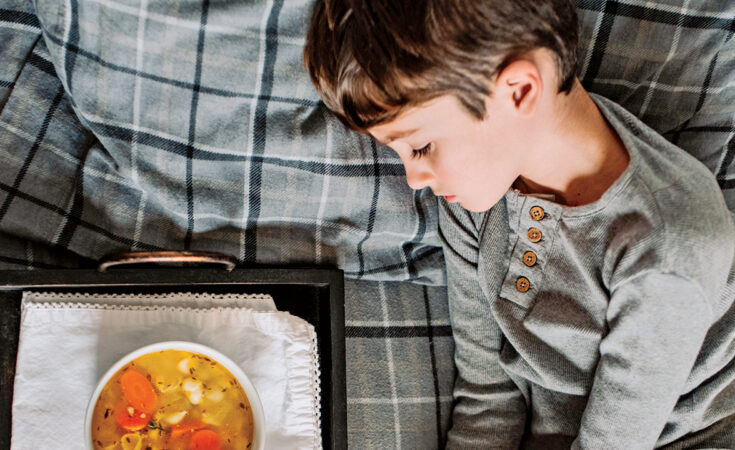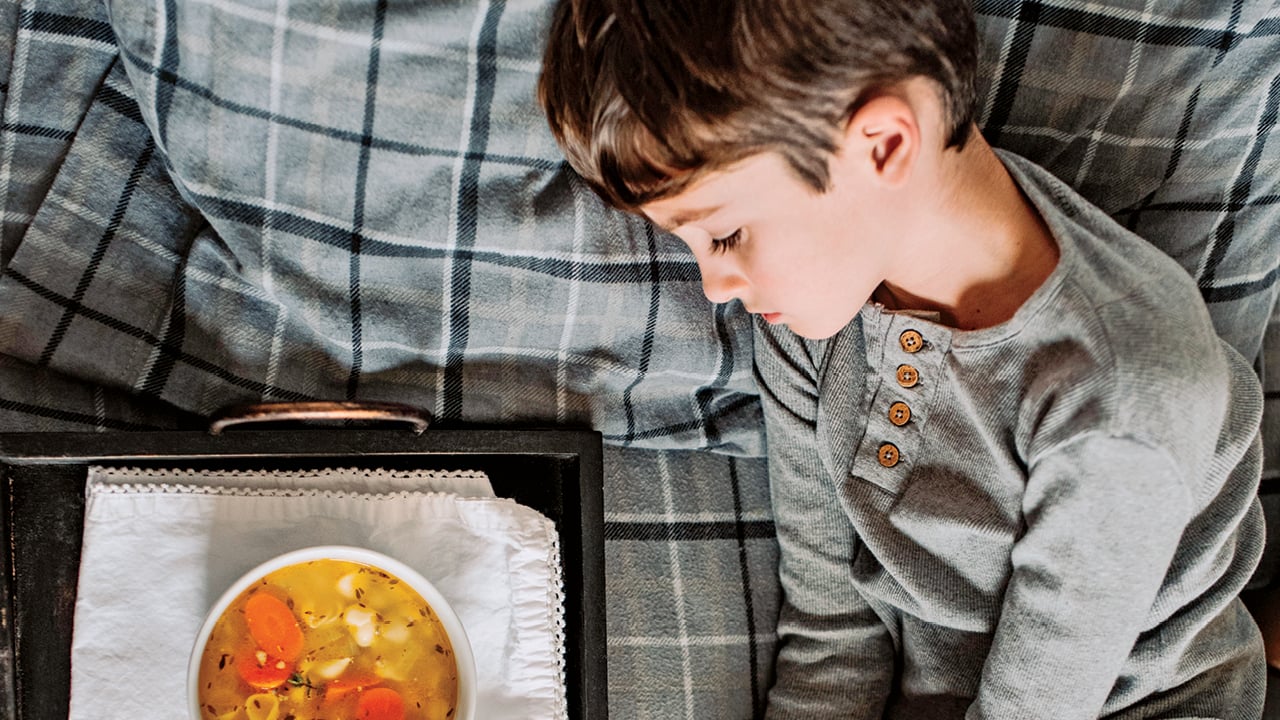When Natalie Romero’s daughter was sick with a stuffy nose, fever and a cough, she brought her to the emergency department—while second guessing herself the whole time. “Her fever wasn’t going away, and she was starting to have a harder time breathing, but at the same time, I worried that she wasn’t sick enough to take her to the ER,” she says. (This was before the pandemic.)
As it turns out, her child was, in fact, sick enough to go. She was diagnosed with a chest infection and the doctor said Romero should have brought her in even sooner. He also showed her how to identify future serious breathing issues by looking for flaring around the nostrils or the muscles sucking in below the ribs.
Most parents have had that should-I-or-shouldn’t-I moment of trying to figure out when to go to the ER. When it’s hard to decide, provincial hotlines like 811 or Telehealth can help. And, as Romero found out, knowing the warning signs that your kid is in serious distress is key. Here are nine red flags that it’s time to head to the hospital.
1. They’re having trouble breathing
It can be hard to tell the difference between a kid who has a bad cough from a cold or the flu and one who’s truly struggling to breathe.
Kirstin Weerdenburg, a paediatric emergency doctor at the IWK Health Centre in Halifax, recommends taking your kid’s shirt off and watching their chest. “Look at their belly muscles, the spaces between their ribs, and around their collarbone,” she says. “Normally when you breathe, the only muscle you use is your diaphragm. If they’re using other muscles to breathe, bring them in,” she says. Another hint your kids needs the ER? If they’re breathing like they’ve been exercising, but they haven’t been.
Other warning signs include continuous wheezing or if your child is having difficulty talking. If their lips or face start to look blue or grey, don’t get in the car—call 911.
2. They have belly pain in one spot
Stomach pain often comes along with diarrhea, constipation or other GI issues, and it can be nothing to worry about. But if it’s preventing your kid from playing, eating and otherwise acting normally, and it is focused in one spot, it could be appendicitis. “I get concerned once the belly pain is away from the centre. It may be nothing, but your child should be looked at,” says Kevin Chan, chair of the Canadian Paediatric Society’s committee on acute care and a paediatrician in Toronto. It’s important to get treatment because if the appendix ruptures, it can be life-threatening. Other symptoms of appendicitis are a low fever, vomiting, losing appetite and feeling nauseous.
3. They have a fever plus other specific symptoms
Fever is the most common reason people bring their kids to the hospital, says Ran Goldman, a professor in the department of paediatrics at the University of British Columbia and a paediatric emergency physician. “About 30 percent of the kids we see in an emergency department are there because of fever or fever with other symptoms,” he says. “Parents are very surprised when we tell them we don’t worry about fever unless it comes with other things.”
The exception to this rule is newborns: Babies under three months old with a fever of 38C (100.4F) or higher need to be seen in the emergency department promptly, because fevers can indicate a bacterial infection and these can be quite serious in newborns.
Babies older than three months and kids should go in if they have a fever along with lethargy—especially if they’re still sleepy after you’ve given them medicine for the fever—or if they’re vomiting non-stop, seem to be dehydrated or are having trouble breathing. Kids who have a fever higher than 40C (104F) should also go in, regardless of additional symptoms.
4. They’re drinking and peeing more
If kids are guzzling a ton of water and urinating more than usual and those symptoms are accompanied by weight loss, they should go to the ER right away for tests to rule out Type 1 diabetes, says Weerdenburg. Other warning signs of diabetes include bedwetting, fatigue, headaches, stomach pain and irritability.
The risk here is that your child could be experiencing diabetic ketoacidosis, which, if left untreated, can lead to hospitalization, coma and even death.
5. They’ve had a deep cut
While a cut might seem like something that can wait until the morning, it often can’t. Stitches need to be done within 24 hours, and ideally within 12, says Weerdenburg. Leaving the wound open can allow bacteria to get in, and stitching it closed after that sets kids up for an infection.
Unfortunately, it can be hard to gauge how deep a cut is yourself. Joanna Cicino, a mom in Sault Ste. Marie, Ont., took her son to the hospital after he tripped and fell while wrapped in a towel after the bath, leaving a gash on his chin. She debated whether to take him to the emergency department and eventually decided they should go, just in case. “The doctor opened the wound to see how big it was, and you could see his chin bone,” she says. Six stitches later, they were home and happy they’d gone.
6. They’re having stomach troubles and are dehydrated
Vomiting and diarrhea are super common in kids, and usually they don’t need any kind of urgent care. (Newborns are, again, the exception: Any baby who is under three months old and is vomiting or has diarrhea should go to the hospital.)
For older babies and kids, these symptoms can lead to dehydration, which can be an emergency. “If the child is only having a few episodes of vomiting and diarrhea and you’re still able to get them to drink enough that they’re peeing, then you can feel pretty comfortable that you’re doing a good job,” says Sarah Reid, a paediatric emergency physician at CHEO, a paediatric healthcare and research centre in Ottawa. But if they’re vomiting or have diarrhea many times, they can’t keep liquids down, there’s blood or green colour in their vomit or blood in their poop, or they’re very sleepy, “that’s a kid we want to see,” says Reid. The hospital will give them liquid to rehydrate them and then monitor their electrolytes; a kid who is severely dehydrated might receive fluids through an IV.
7. They had a big fall
You don’t have to rush to the ER for every fall. But if they toppled from a good height, you probably should. “If they fell from a height higher than their body, go to emerg,” says Goldman.
For lower falls, if your kid has any other symptoms, they should go in. Red flags for babies and toddlers include not feeding well, being very drowsy or hard to wake up, vomiting, having a bump on their head or swelling of the soft spot on the top of their head, or unusual behaviour. For older kids, headache, vomiting, drowsiness, confusion and unusual behaviour are warning signs.
One more thing to watch out for after a fall is a broken bone. They don’t always look obvious: If your kid is not using a limb or seems to be in pain, you probably need an X-ray, and, in most places, that means an ER visit.
8. They’re having an allergic reaction
If your kid breaks out in a rash or hives, especially after eating, a trip to the ER may be warranted because an allergic reaction can lead to anaphylaxis, which is life-threatening. The first thing to do is check to see if the reaction only involves the skin, or if your child’s circulation or breathing is affected as well. “The main thing we look for is breathing issues,” says Chan, like a croupy cough or a stridor (high-pitched sound when breathing). “The other component is, do they look pale as a ghost? That can be a sign their blood pressure is dropping.” Dizziness and blue lips can also be signs of a serious allergic reaction. If any of those things are happening, don’t drive your kid to emerg—call 911 instead.
If it’s just a skin issue, you can hold off on going to the emergency department—but do call your doctor to ask for advice and to follow up for allergy testing.
9. You feel like something is off
If your child is sick and you feel deep down like something is wrong, that’s reason enough to go to the ER.
“If you’re at home with your child and you’ve done what you can, and your child still seems unwell, they’re still not acting like themselves, I would err on the side of caution and come in,” says Reid. “Parents have a good spidey sense about their kids. When they feel like something is off, I don’t want them to talk themselves out of it. I want them to come in.”



































